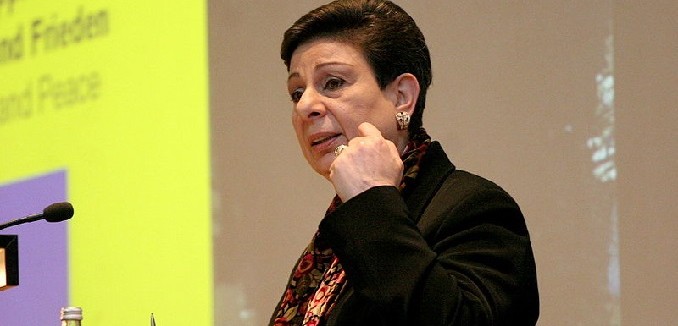An internationally funded NGO founded and chaired by prominent Palestinian legislator and media personality Hanan Ashrawi is struggling to regain its credibility after accusing Jews of using the blood of Christians as part of Passover rituals, then defending the blood libel, then removing the accusation, and now finally apologizing. In the meantime critics have discovered other controversial articles published by the NGO, including one romanticizing female suicide bombers.
The anti-Semitic blood libel, published on the Arabic site of Ashrawi’s Miftah NGO, was in response to President Barack Obama’s recent speech in Jerusalem in which president positively referenced the holiday. The article has been removed but can be still viewed on the Elder of Ziyon blog, which first broke the story. A later post on the blog describes how, when initially confronted, Miftah lashed out and defended publishing the classic anti-Jewish trope as a way to create dialogue:
Miftah has responded to my exposé of their anti-semitic article last week:
“MIFTAH strongly denounces the smear campaign being carried out against it and, by association, its founder Dr. Hanan Ashrawi. The obscure pro-Israeli website “The Elder of Ziyon” has wrongly accused MIFTAH and Dr. Ashrawi of promoting Jewish blood libel during Passover through its publication of an Arabic-language article that briefly addressed the subject.
The disclaimer at the opening of the “News and Analysis” section clearly states that, “The views represented in [News and Analysis] are solely those of their authors and do not necessarily reflect the views of MIFTAH, but rather fulfill its mandate for open dialogue.” For the record, to avoid further misunderstanding, Al Zaru’s article has been taken down from MIFTAH’s website.”
After being slammed by watchdog groups for the stance, Miftah subsequently reevaluated, blamed a “junior staff member,” and issued an apology. Power Line documented the timeline in a post published this morning:
MIFTAH responded with a denunciation of Elder of Ziyon as an obscure pro-Israeli blogger promoting a “smear campaign.” MIFTAH wanted it known that it had just been furthering “dialogue.” In a post dated April 1, however, MIFTAH has succumbed to second thoughts (emphasis in original):
“MIFTAH would like to apologize for the recent and brief publication on our website of an article penned by Nawaf Al Zaru that discusses Jewish blood libel during Passover.
It has become clear to us after investigating this incident that the article was accidentally and incorrectly published by a junior staff member. The said staffer has been reprimanded and all our staff has been informed as to the disgusting and repulsive phenomena of blood libel or accusation, including its use against Jews. Dr. Hanan Ashrawi, as founder, has nothing to do with the day to day management at MIFTAH and was no way involved in this incident.
The apology is unlikely to still criticism of Miftah. Activists and watchdog groups continue to express concern over, among other things, articles going back almost a decade that glamorize suicide bombers:
Palestinian women have also participated in the resistance. As the conflict grew more intense and young men were recruited to carry out military operations against Israeli targets, several young women also decided to join the ranks of the resistance movement. In January 2002, 28-year-old nurse Wafa Idrees, detonated a bomb in Jerusalem’s Jaffa Street, killing one Israeli and injuring 150 others. She was also killed in the blast.
This marked the beginning of a string of Palestinian women dedicated to sacrificing their lives for the cause. Over the next two years, seven other women carried out similar operations, the most deadly of which was carried out by Hanadi Jaradat, a 29-year-old attorney from Jenin. Hanadi detonated explosives strapped to her body in a busy Haifa restaurant, killing 19 Israelis and injuring 50 others.
The scandal promises to bring renewed scrutiny to government funding, especially European government funding, which is used by both governmental and nongovernmental institutions to incite hatred against Jews and Israel. The watchdog group NGO Monitor has documented financial contributions to Miftah from multiple European governments, from the European Union itself, from the U.S.-based Ford Foundation, and indirectly from the U.S. government via the National Endowment for Democracy and the International Republic Institute.
Norway – one of the countries that funds Miftah – has found itself under particularly harsh criticism for contributing to Palestinian institutions that glorify mass violence against Israeli Jews.
[Photo: Carsten Sohn / Wiki Commons]




